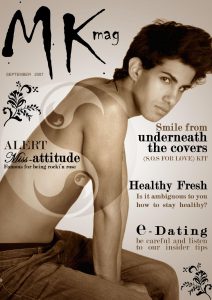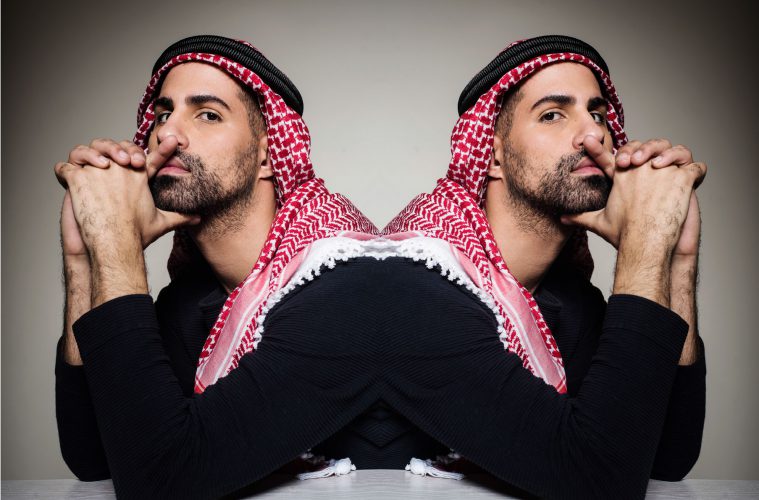My.Kali was born from the need for expression, reflection and the demand of LGBT people to be acknowledged as human. In its journey to carve a space for LGBT people in Jordan and the Middle East, the publication faced all sorts of obstacles, many of which persist to this day. During this period, we celebrate our 10 year anniversary and our resilience in the face of countless efforts to delegitimize and silence our voices. This is the story of Khalid Abdel-Hadi, the founder of My.Kali, when he was singled out by Jordanian media and outed as gay to the public. This is the story of how Khalid refused to allow them to push him back into the closet and pursued his vision of bringing this publication to life.
By Khalid Abdel-Hadi
Photography: Alisa Zaira Reznick
Editor: Salman Husain
Almost exactly 10 years ago, in late 2007, Jordanian media published news related to LGBT people for the first time. But what could have been a historical milestone in Jordanian history was instead a traumatic moment in my personal life. At the time, My.Kali was only just getting started, and my vision of creating a publication that offered LGBT people a space to articulate their realities was in its early stages. The trouble began when the media caught on to a copy of the first edition cover page of My.Kali, which was not intended to be published. Motivated by bigotry and misinformation, a Jordanian news article smeared our publication and cause. In the process, it also outed me personally to the Jordanian public due to my role as its founder. Having my sexuality exposed in a conservative society that did not have the space to discuss, let alone mention casually, LGBT issues was deeply disturbing.
During September and October of 2007, My.Kali was just a blog that wasn’t fully launched and there was no intention of publishing the first edition. I wanted to print the cover page pictured above, and at the time displayed on our website, in order to promote an event we were planning. I chose to be photographed for the cover photo because I wanted to share my personal story with the community on my own terms. But someone alerted Jordanian media to the photograph and the blog, and they invented an entirely different story.
Members of the media sensationalized my personal narrative through false news stories in order to demonize LGBT people. The newspaper that published the first article slandering me claimed that they discovered a plan on our blog to hold a secret LGBT conference and found an LGBT magazine. These claims were completely false.
While exposing this supposed plot to promote an LGBT agenda in Jordan, the newspaper seized the opportunity to further humiliate LGBT people. A man claiming to be gay was interviewed for the article, stating that his lifestyle was deviant and perverted, and that he wanted to be healed. The paper framed our blog as a conspiracy against Jordanian society, making it sound as if we were taking advantage of a public distracted by government elections to hold an immoral conference. They also presented themselves of the savior of Jordanian culture and traditions by “exposing” our supposed agenda.

My.Kali’s first edition launched in September/October 2007, featuring the platform’s founder, Khalid Abdel-Hadi
These devastating events came at a time in which I was facing many personal issues with my family: coming to terms with my sexuality, clinic-hopping, meeting with psychiatrists my parents wanted me to see in hopes of curing my homosexuality, and failing school. The last thing I needed at this vulnerable time in my life was a paper outing me to a generally conservative society and humiliating my family.
At the time, the only news published about LGBT people in the region involved coverage of the persecution, torture and abuse to which they were subjected: militias killing LGBT individuals in Iraq, the public hangings in Iran, the online phishing of individuals in Egypt, random arrests in Saudi and Syria, and other dark events. When I saw my half naked picture in Jordanian newspapers, visible to hundreds of thousands of readers throughout the country , my mind quickly shifted to these stories, the stories of oppression of LGBT people throughout the region. I thought that there was a real possibility that I would be arrested or killed in my own country.
In 2007, social media had not yet attained the level of influence and popularity that it would later enjoy in Jordan. But even ten years ago, I was subjected to online bullying with comments from people wanting me dead or arrested. This was horrible to read at that time and affected me deeply. I didn’t know how to begin to address the issue or where to seek help, and this was certainly not the kind of attention anybody would have wanted at any age, in any country or at any time.
My life changed soon after and I began to publicly advocate for recognition of diversity of gender identities and sexual orientation- something many people in the MENA region still face difficulty in doing. Something that was once an extremely private matter now became the center point of my life and a topic of public discussion.
In 2016, the Jordanian Media Commission made a futile attempt to to intervene on our behalf after several news outlets falsely claimed that we were being granted a license and official registration in Jordan. After incitement from the media towards the government about the registration, printing and licensing of our publication, The commission released a statement in July of 2016, clarifying that this was not the case and its General Director, Dr. Amjad Al-Qadi, called upon the media to be accurate and to take in public interests instead of publishing false news. He urged journalists to contact relevant authorities to fact check and verify validity of news stories they sought to publish. Despite his early efforts to protect our rights, he caved under pressure from the media and the public, and proceeded with censoring our publication.
It’s a shame that after 10 years, the same kind of media in Jordan still practice the same brand of sensationalized journalism that they did back then: provocative titles, incorrect terminology, unknown, unreliable and untraceable sources, a love for scandal, generalizations of the LGBT+ issues, promotion of all sorts of stigmas, distortion of facts and inventions of lies.
What is concerning is that inflammatory journalism and harmful practices still exist and are tolerated by the public, or that these outlets are licensed despite the fact that they feed on shaming others and inciting the public against minorities. After 10 years of being exploited, humiliated and dehumanized by Jordanian media, I can personally say that the media has played a major role in dehumanizing the LGBT+ community through misguided coverage of LGBT+ people, causing our society to be ill-informed about the LGBT+ community and the struggles we face. Inaccurate information and bigotry within reporting have placed this community in real danger, exposing them to physical and psychological harm, just like the horrendous role the media has recently played in Egypt with a crackdown on the LGBT+ community. The media has created a hostile environment in which coming out, identifying as LGBT+, etc. is more difficult than it already is in the Middle East.
Pursing My.Kali didn’t come without a price. I was blackmailed by those with whom I initially started the platform, in light of the controversy and fear, demanding that I close the publication’s site. My parents recieved calls outing me personally, and pointing out the publication to my family, which was very difficult for them to deal with. I wasn’t in a good place, and that had a huge implications on my personal life. In addition to that, some of those I knew refrained from being acquainted with me and others were reluctant to befriend me.
For years, the Jordanian media tirelessly tried slandering me as an individual and My.Kali as a platform, seeking to advance a bigger agenda of dehumanizing an entire group: LGBT+ people. The fact that they were willing to sacrifice a fellow member of their society in order to do so shows much about the lengths these outlets would go to for their agenda of hatred. The media is yet to repent from their ongoing acts and correct its mistakes.
Despite these challenges, My.Kali remains a platform committed to enriching our society, not insult our traditions ! This platform has been a constant voice for our community, a diverse outcome amid the various media that the country or the region has to offer. And it certainly does not either directly or indirectly corrupt our society as the media would have Jordanians believe. This platform has survived an entire decade and will continue to stand as long as it’s needed and helps give a voice to the hundreds of thousands of LGBT+ people throughout the MENA region.
References of media channels (2007) – Arabic:
This letter was also featured on The Dissident Blog

